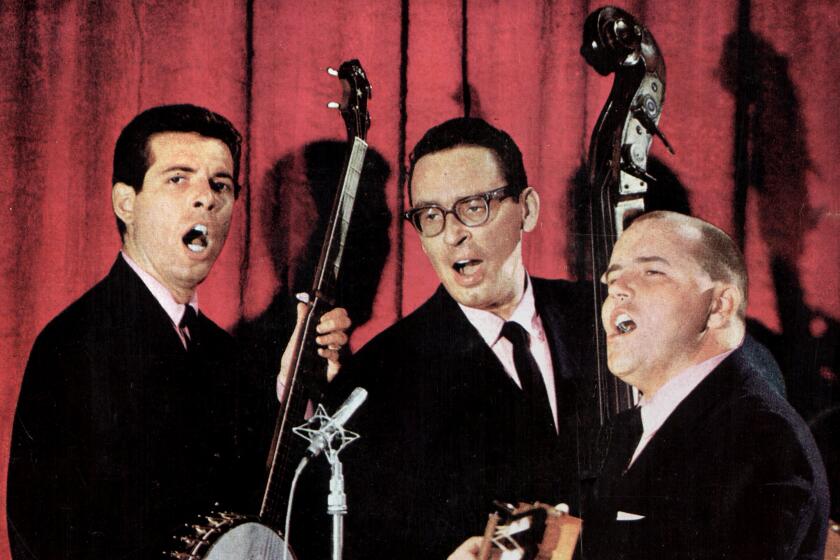You Figure It Out
Frieda: You’re eating early because you’re going to a Broadway show.
Ira: We’re going to BAM to see an experimental all-male Irish “Oresteia.” Marjorie says the director is a 25-year-old international wunderkind.
Frieda: She’s making you schlep all the way out to Brooklyn. Dear merciful God.
Ira: It doesn’t take long on the subway.
NEW YORK--High-culture maven Marjorie Taub is plotzed on the couch in her Upper West Side co-op. All around the room are shelves filled with books--the library of someone who spends a lot of time reading and going to lectures at the 92nd Street Y and the New School for Social Research. But Marjorie is depressed. Oy, is she depressed.
In fact, Marjorie recently had an episode. Not a suicide attempt, you should know, but she did smash a few--OK, a number of--figurines in the Disney store. Not to worry, they’re not pressing charges.
Marjorie is the title character in Charles Busch’s comedy “The Tale of the Allergist’s Wife,” which opens Wednesday at the Ahmanson Theatre, directed by Lynne Meadow and starring Valerie Harper, Tony Roberts and Michele Lee.
Harper, who plays Marjorie, is not sitting on the couch. In fact, she’s not sitting anywhere just yet, because she hasn’t shown up at the publicists’ office where she’s scheduled for an interview. She’s reportedly stuck in midtown traffic, or dealing with problems at her apartment, as it’s later learned.
Roberts has already arrived, looking hale in a black knit shirt and a brown tweed sport coat. The veteran stage and film actor plays Harper’s husband of 32 years, the highly successful and recently retired allergist Dr. V. Ira Taub. As a lifelong New Yorker, Roberts has a thing or two to say about this show--and how the long-running Broadway hit may play in L.A. “All the references are very New York savvy, and for that reason, we were very worried when we first started whether or not audiences across the Hudson would dig it,” he says. “Even the pundits of New York are hard put to explain how this has gone on.”
For a guy who says “dig it,” he seems to know what he’s talking about. “The themes of this play are universal,” he says. “They don’t only apply to any one ethnic or cultural group. It doesn’t matter that nobody west of the Hudson ever heard of the 92nd Street Y. She could say it was the 186th Street Z. It wouldn’t matter. They’re picking up on things that have nothing to do with being Jewish or being in New York.”
The human whoopee cushion in this Gotham “Tale” is Lee Green (played by Lee), Marjorie’s old childhood friend who suddenly appears and stirs things up. “You don’t have to be Jewish to like rye bread,” says the L.A.-based actress, speaking by phone a few weeks later. “This average couple is just on their journey in life and things happen to them. And of course there’s all kinds of sexual titillation that people wouldn’t expect.”
Mohammed: Mrs. Taub, describe to me your vision once more.
Marjorie: It should be a feverish dream out of Baudelaire. Exotic, mesmerizing. This doesn’t say “extravagant decadence.” This says “lighting fixture.”
Mohammed: No it says “romantic opulence.”
Marjorie (losing her patience): It says “Repro bought at cost.”
In Scene 1, Marjorie appears in a schmata of muumuu-like proportions, a sartorial horror. Later on, once Lee is on the scene, she’s in Vera Wang.
Busch is a man who knows that clothes make the woman--as well he ought. He wore enough of them. In his earlier escapades, that is.
In the mid-1980s, Busch reigned as one of the premiere thespian drag queens of the East Village. He was known for writing and starring in a clutch of campy cinema send-ups, including “Vampire Lesbians of Sodom” and “Psycho Beach Party,” which was released as a low-budget film in 2000. Yes, honey, it’s that Charles Busch.
More recently, he’s shed the false eyelashes and gotten serious about his writing. In fact, the Pasadena Playhouse recently announced that next spring it will stage an adaptation of the Truman Capote-Harold Arlen musical “House of Flowers” by the erstwhile downtown diva and his longtime director, Kenneth Elliott. Set in a West Indies bordello, the retooled 1954 work could prove Broadway bound. No casting announcements yet, but wags on the Rialto say Busch and Patti LaBelle are in a dead heat for the lead.
But back to the opus du jour, the one that put the stardust in his stilettos in the first place. It’s a midlife crisis comedy about a woman who has achieved a certain level of comfort and now finds herself at a loss. Into her malaise trots her old girlhood pal, looking sensational, to present poor Marjorie with the unbearable contrast of everything her life is not.
So who is this intruding enigma? “I would rather not say who I think my character is, it’s really nobody’s business,” chirps Lee, best known from her Emmy-nominated stint on the 1979-93 CBS series “Knots Landing” and still ever so hostess-with-the-mostes’ bubbly.
“Almost nobody understands her,” Lee continues. “They understand the outcome of what she does, the ramifications. And the wonderful complications of who she might be are what one can have some fun with. And of course she’s so delicious because she’s done everything and everyone.”
Lee serves as a catalyst to getting Marjorie off her angst-ridden tuchis. “Even though she’s coming into a situation where it’s a married couple, there is something awry,” Lee says. “She’s coming into their lives at a time when things are a little disjointed.
“Marjorie is searching for herself,” Lee continues. “She’s unhappy, that’s how I read it. My character helps nudge the Marjorie character. And by the way, the reason I’m always talking about Marjorie is that this is Marjorie’s plight, no question about it.”
Marjorie’s story began to take shape in the late ‘90s, when Busch was working on a number of projects, including the book for the 1997 Rusty Magee musical “The Green Heart,” which was produced at the Manhattan Theatre Club, where Meadow is artistic director.
After “The Green Heart,” Meadow and Busch decided to work together again, and Busch began developing a piece based on a character from his solo show, “Flipping My Wig.” That character eventually became Marjorie. The role was originally written for Linda Lavin, who starred in the show’s premiere run at the Manhattan Theatre Club in 1999 and went with it to Broadway the following year.
“Mr. Busch, it would seem, has swum straight into the mainstream,” the New York Times’ Ben Brantley wrote. “And with the graceful, unobtrusive assistance of the director ... he stays comfortably afloat there. ‘Tale’ has moments cut from the synthetic cloth of television comedy, and it doesn’t quite know how to resolve itself. But it earns its wall-to-wall laughs.”
(The doorbell rings. Ira runs on holding a bottle of tranquilizers. He answers the door. It’s Lee, holding two suitcases.)
Lee: I am so sorry I’m late. I had this forcockta Indian cabdriver who took me all the way across the river.
To millions in TV land, Harper will always be Rhoda Morgenstern, from “Rhoda” and “The Mary Tyler Moore Show.” “This is only the second New York Jewish character I’ve played since Rhoda,” she says. “She’s very different from Rhoda. They come from the same background, but she did what Rhoda wanted to do, nail a fabulous Jewish doctor and have wealth.”
More recently, Harper has been in the news with the Screen Actors Guild presidential elections, first in November, and then, after that vote was voided because of alleged irregularities, again in March. It was a particular nasty bout of old guard-new guard mud wrestling. To be sure, Harper held her own with the hair pulling but ultimately lost to that little parvenu on the prairie, Melissa Gilbert. Now, she’d rather not talk about it.
“You went through lots that I didn’t know about,” Roberts says. Harper smiles and shrugs off the whole tsurris.
Harper joined the cast of “The Tale of the Allergist’s Wife” in July 2001. She and Roberts had never acted together before, but they had some common history to help lay the groundwork for their stage marriage. It’s no mean feat to create the illusion, night after night, of 32 years of sharing the sheets--and Harper, a second wife at that after the much-loved Lavin.
“We’ve known each other for a long time,” Harper says.
“Yes,” adds Roberts, “We had a mutual decorator.”
Actually, it goes back further than that.
Harper: I went to a professional children’s school called the School for Young Professionals on 56th Street. I graduated from Luchow’s, if you can imagine.
Roberts: Luchow’s restaurant?
Harper: It was a tiny little private school. We had dinner in the back room, and Mr. Quintano handed out the diplomas. So I graduated from Luchow’s.
Roberts: My family went to dinner there every Sunday night when we were growing up. They had those violinists and Viennese music. It was the place for families to go on birthdays and occasions.
Harper: And graduations of small schools. I’m so sorry it closed.
Roberts: My graduation was at Carnegie Hall. I went to the High School of Music and Art. How do you get to Carnegie Hall? Practice.
Harper: The old joke, right. My first job was at Radio City Music Hall as one of the corps de ballet. In those days, the Rockettes were the headliners, but there were 32 of us called the ballet girls. There was a dog act sometimes and a magician. It was a complete show, and we did it sometimes five times a day.
Roberts: You were the third from the left. You winked at me.
Harper: I probably did.
All three stars agree that they disagree about whether there’s a message in “The Tale of the Allergist’s Wife,” and if so, what it is. Like a number of critics, they’re also at odds over the play’s cockamamie ending.
For the two-time Tony nominee Roberts, who has appeared in 20 Broadway productions and many films, the key lies in the episode that gets everything going in the first place. “I would say that it’s about the condition of modern life for an intelligent and sensitive woman who is having a life crisis,” he says. “The event that starts the play is the breaking of the statues in the Disney store. It’s a very important statement.”
Lee sees it as a matter of Marjorie taking responsibility. “One of the important things that is said is that we can only change ourselves, not the people around us,” she says. “So when Marjorie goes through her plight, initially complaining and fighting and trying to change the people around her, by the time my character does whatever she does, Marjorie walks out understanding that Ira is a benevolent husband. And when the mother, Frieda, leaves, Marjorie allows her mother to be her mother. She’s not trying to change her anymore.”
Harper’s take is Rhoda-like in its clarity. “For me, Charles’ good message is: Get off the couch,” she says. “You’re fine like you are. Embrace your family with warts and all. Just be who you are. Cook something with your doorman.”
“I disagree with you, but it’s a very healthy disagreement,” Roberts says. “I think Charles is tapping into a kind of frustration that exists among all people at this age in life who have had children, whose parents are still alive in some form, and who’ve achieved the security of not having to worry about money. That’s why I think that the last message of it is ‘a forget your troubles and be happy’ ending.”
Harper: No, it isn’t.
Roberts: Whatever it is, it’s only, forgive me, a sitcom denouement out of a serious issue that’s been raised. The way you get out of it is not to wrap it up as quickly as you can with a few jokes, and that’s what the last part of the play is about, I’m sorry.
Harper: I don’t see it as a sitcom windup. I think it’s deeper than that. Yes, he’s saying, forget the obsession. For God’s sake, seize the day.
Roberts: There is a reconciliation and Marjorie is probably going to not be so crazy and go in and break statues anymore. But she hasn’t really solved the existential dilemma that Charles has raised in the earlier part of the play. This play is not about a woman who says, ‘Why haven’t the caterers gotten here?’ It’s about a woman who says, ‘Why doesn’t my life mean anything?’ And everyone in the audience is saying, ‘Yes, that’s what we want to know!”
Yet for all their differences of opinion about the particulars of “The Tale of the Allergist’s Wife,” Roberts, Harper and Lee agree that the experience of performing in Busch’s play has given them renewed insight into the universality of comedy.
“What the audience perceives is that none of the particular references matter,” Roberts says. “What they pick up are the generational conflicts between the mother and the daughter, the problem between this woman and the culture in general, between this woman and time going by, of this woman’s feeling insignificant in terms of her life’s contribution. And that’s what they’ll see in Salt Lake City and Philadelphia, and whether they’re gentiles or Asians or whatever. These are universal truths.”
“The Tale of the Allergist’s Wife,” Ahmanson Theatre, 135 N. Grand Ave., downtown L.A. Opens Wednesday at 8 p.m. Regular run: Tuesdays-Fridays, 8 p.m.; Saturdays, 2 and 8 p.m.; Also Sundays, 2 and 7:30 p.m. through July 21. Thursdays 2 and 8 p.m. from July 25 to Aug. 8. Ends Aug. 11, 2 p.m. $20-$60. (213) 628-2772.
Jan Breslauer is a regular contributor to Calendar.
More to Read
The biggest entertainment stories
Get our big stories about Hollywood, film, television, music, arts, culture and more right in your inbox as soon as they publish.
You may occasionally receive promotional content from the Los Angeles Times.






